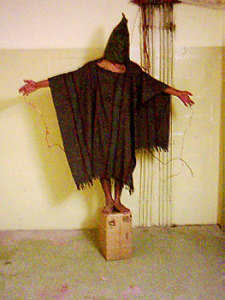 Yesterday, the New York Times reported (though the newspaper buried the story on page A21) that Obama Administration lawyers are debating whether the US has to comply with the Convention Against Torture’s prohibition on degrading treatment overseas.
Yesterday, the New York Times reported (though the newspaper buried the story on page A21) that Obama Administration lawyers are debating whether the US has to comply with the Convention Against Torture’s prohibition on degrading treatment overseas.
It is considering reaffirming the Bush administration’s position that the treaty imposes no legal obligation on the United States to bar cruelty outside its borders, according to officials who discussed the deliberations on the condition of anonymity.
[snip]
The administration must decide on its stance on the treaty by next month, when it sends a delegation to Geneva to appear before the Committee Against Torture, a United Nations panel that monitors compliance with the treaty. That presentation will be the first during Mr. Obama’s presidency.
State Department lawyers are said to be pushing to officially abandon the Bush-era interpretation. Doing so would require no policy changes, since Mr. Obama issued an executive order in 2009 that forbade cruel interrogations anywhere and made it harder for a future administration to return to torture.
But military and intelligence lawyers are said to oppose accepting that the treaty imposes legal obligations on the United States’ actions abroad. They say they need more time to study whether it would have operational impacts. They have also raised concerns that current or future wartime detainees abroad might invoke the treaty to sue American officials with claims of torture, although courts have repeatedly thrown out lawsuits brought by detainees held as terrorism suspects.
In other words, in the next month or so, the Obama Administration will decide how serious it really is about Obama’s 5-year old promise to end torture.
But in many ways, Obama has already demonstrated a lack of seriousness — indeed non-compliance — with the Convention.
As NGO Open The Government lays out in a report in anticipation of next month’s delegation, the Administration has not fulfilled the terms of the treaty, in large part, because it is working hard to keep details of our torture secret.
This policy of official secrecy about torture and cruelty prevents candid reporting to the Committee, and has led to direct violations of the United Nations Convention Against Torture and Other Cruel, Inhuman or Degrading Treatment or Punishment (hereinafter “CAT” or “Convention Against Torture”), particularly:
- The obligation to provide torture victims with a right to complain of their treatment, without retaliation against the victim or witnesses, and to provide a legally enforceable means of redress, including compensation and as full a rehabilitation as possible (Articles 13 and 14)
- The obligation to ensure that statements resulting from torture are not used as evidence in court proceedings (Article 15)
- The obligation to promptly and impartially investigate victims’ complaints of torture and cruel treatment, to criminalize all acts of torture, and to prosecute violations (Articles 4, 5, 6, 7, 12, 13 and 16)
- The obligation to cooperate with foreign investigations, prosecutions, and other legal
proceedings concerning acts of torture (Article 9)
The report then lays out the ways in which the US is still not complying with the CAT:
- Limiting past victims of US torture — including Gitmo detainees — from any redress, and even the ability to speak of their torture in military commissions against them.
- Hiding the names of CIA interrogators in the Senate Torture Report.
- Classifying information needed to investigate those killed by torture.
- Refusing to cooperate with foreign investigations of complicity with US torture.
And it sums up that at the heart of this non-compliance is our secrecy.
All of the violations of the Convention Against Torture discussed above flow from a single source: the decision to allow the United States’ intelligence services to classify evidence of torture, even the victims’ memories of it. If torture is a state secret, impunity inevitably follows.
The Times report raises real questions about current conduct, particularly of our special High Value Interrogation Group that interrogates alleged terrorists.
But as Open the Government notes, regardless of what we decide on CAT compliance, we’re still not doing what we need to do to comply with past obligations on torture.


